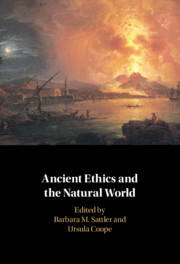Book contents
- Ancient Ethics and the Natural World
- Ancient Ethics and the Natural World
- Copyright page
- Dedication
- Contents
- Contributors
- Note on the Editors
- Introduction
- Part I Humans in Nature: Nature and Law, Humans and Natural Catastrophes
- Part II Humans as Godlike, Gods as Humanlike: Presocratics and Platonists
- Part III Emotions, Reason, and the Natural World (Aristotle)
- Part IV Action and the Natural World (Aristotle)
- Part V The Naturalness of Goodness
- Chapter 10 Eudoxus’ Hedonism
- Chapter 11 Aristotle and Socrates in the Eudemian Ethics on the Naturalness of Goodness
- Bibliography
- Index Locorum
- General Index
Chapter 11 - Aristotle and Socrates in the Eudemian Ethics on the Naturalness of Goodness
from Part V - The Naturalness of Goodness
Published online by Cambridge University Press: 13 August 2021
- Ancient Ethics and the Natural World
- Ancient Ethics and the Natural World
- Copyright page
- Dedication
- Contents
- Contributors
- Note on the Editors
- Introduction
- Part I Humans in Nature: Nature and Law, Humans and Natural Catastrophes
- Part II Humans as Godlike, Gods as Humanlike: Presocratics and Platonists
- Part III Emotions, Reason, and the Natural World (Aristotle)
- Part IV Action and the Natural World (Aristotle)
- Part V The Naturalness of Goodness
- Chapter 10 Eudoxus’ Hedonism
- Chapter 11 Aristotle and Socrates in the Eudemian Ethics on the Naturalness of Goodness
- Bibliography
- Index Locorum
- General Index
Summary
Christopher Rowe argues that Aristotle in the Eudemian Ethics develops a naturalised account of Socrates’s divine sign: even people lacking in practical wisdom, Aristotle proposes, can act appropriately, and achieve a kind of happiness, because of something divine in them. But this ‘something divine’ is not (as it is for Socrates) a private inner voice, rather a kind of well-naturedness. For Aristotle, goodness is natural. The goodness of human nature explains how it is possible to do the appropriate things even without reasoning, and even do so reliably. This offers Aristotle an answer to a puzzle about our relation to the natural world. Humans, he holds, are good by nature, yet he also holds fully virtuous human beings to be relatively rare: two claims that are hard to reconcile, given Aristotle’s usual view that what occurs ‘by nature’ occurs ‘always or for the most part’. By allowing there to be a level of decency that is achievable through well-naturedness, even by those who lack full virtue, Aristotle can answer this puzzle. If this decency is achieved by many people, then there is, after all, a kind of good human development that occurs by nature and occurs regularly.
Keywords
- Type
- Chapter
- Information
- Ancient Ethics and the Natural World , pp. 203 - 217Publisher: Cambridge University PressPrint publication year: 2021

